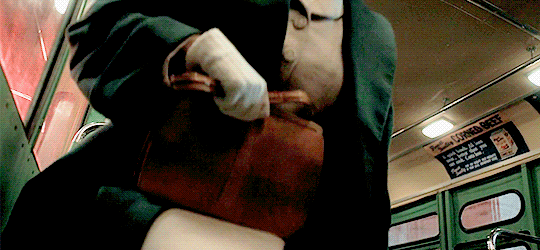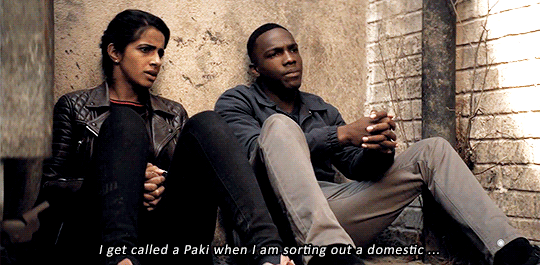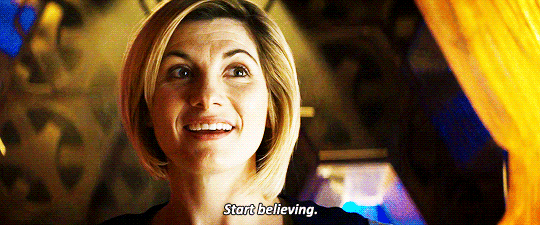The Thirteenth Doctor and her friends are trying to get back to Sheffield, 2018, but the TARDIS brings them to Montgomery, 1955 instead. The Doctor soon realizes that they are meant to be there in order to stop a time-traveler from interfering with a tremendous moment in history on December 1— when Rosa Parks refused to obey a racist law.
Once again, if you haven’t yet seen the episode just go watch it. Maybe watch the first two episodes of series 11 as well but you don’t need anything else, just watch “Rosa”. Not only is it a great introduction to Doctor Who, highlighting what the show is truly about, but also a powerful piece of television on its own right. Hell, it’s the most poignant and meaningful episode that the show had in a long while. I had to look up the list of episodes to be able to say since when, exactly, and my answer would probably be “The Rings of Akhaten”. But given how underwhelming that 2013 episode was for some, it’s probably been even longer since we had something this good.
Monster of the Week – Racism itself
During its 55 year history, Doctor Who has acknowledged the issues of racism once or twice. But the Doctor dismissing their black companions’ concerns about racism in Elizabethan London and again during the Regency is not the same as what “Rosa” provided us with. Okay, Twelve punching Lord Sutcliffe for being racist against Bill was an improvement to Ten’s almost absolute lack of concern for Martha. But Thirteen takes it a whole new level here, as does the episode itself. The reason? In this case, the antagonist is racism itself.

Sure, Krasko and natives of Montgomery embody this blatant racism so we have actual people to root against. But make no mistake, the real villain is the concept itself, more than any individual who believes in it. Fortunately, this doesn’t mean that the people of Montgomery get a pass: their racist and hurtful remarks towards both Ryan and Yaz are treated as serious and wrong. Their comments might be products of their environment and James Blake might try to justify it (”just the way it is”) but they’re still called out on it.
Part of why this episode is so important in how it deals with the topic is that it doesn’t feature just “that one racist guy”. Krasko is the main antagonist, a time-traveler who goes back in time just so he can stop the Civil Rights Movement before it really kicks off. He’s also a self-admitted terrorist (though the word itself is not used) who murdered thousands and is fueled by hate. Yep, he’s bad. But his motivation is just pure racism and he’s only one component in this bigger picture of systematic oppression. He’s appalling, but so is James Blake and Mr Steele and Police Officer Mason. They all play a part and for that they are all presented as part of the monster of the week.
Before anyone says that this means white people were the villains this week and that Doctor Who has gone too far in doing that: stop. Stop to think about how a), white people weren’t the problem just because they’re white, they’re the problem because they participate in the oppressive system and accept it the way it is, because they can. And b), “not all white people”. The trope of this one good white person in 1950s Alabama who defies racism because they are somehow magically better than that was avoided. But the main characters, namely the Doctor and Graham, did acknowledge their privilege in small ways. The Doctor is a curious case as this was the first time (that I can think of) that they truly thought about their privilege. Sure, the Doctor is technically an alien but a humanoid one who, so far, has only ever been white. And while the Thirteenth Doctor is a woman now and that is bound to come up in certain situations when she tries to take charge, she was fine in Montgomery. She did, however, finally realize what travelling to the past might mean for her companions.
As for Graham, he’s obviously a good guy. Ryan’s unwillingness to consider him family can get on his nerves, but he’s otherwise nothing but supportive. He truly cares about his grandson and wants to protect him, and he realizes that he wasn’t the only one to lose Grace. Graham’s a good guy who doesn’t agree with anything that James Blake or the other locals are saying, but he’s still quasi-forced to be part of history and be “on the wrong side of it”, as it was. The Doctor tells him that they must stay on the bus so Rosa will be asked to move and they must not help her. That one look Bradley Walsh gives is the best piece of acting I’ve seen from him so far. He wants no part of this moment because it belongs to Rosa and yet he has to be one that she’s supposed to give her seat to. He doesn’t agree and he wants to help, but history demands that he stays on the bus.

Can’t used to being in the past
As this is the third story of a new Doctor, the episode is a historical one (see “The Unquiet Dead”, “Tooth and Claw”, “Victory of the Daleks”, and “Robot of Sherwood”). I’m a big fan of the Doctor and co. travelling to the past and doing historical episodes right — even when they are not so stellar they are still better than the weakest sci-fi/future/alien stories. What’s even better about “Rosa” is that though it’s not a “pure historical” (like those of the Hartnell years or “Black Orchid”, the last of its kind) and does include some supernatural elements, the theme and core are very much human. As explained above, the monster was a very human concept. And doesn’t that make it all the more terrifying? Bring on the Daleks, the Cybermen, Sontarans, whoever, but “Rosa” presented us with one of the scariest villains so far.
What’s more is that the episode doesn’t hesitate to draw parallels to modern-day racism. What’s especially good to see is that Ryan and Yaz discuss their experiences in the UK, acknowledging that 1955′s America was bad (and 2018′s America still has to improve) but Britain isn’t perfect either. There’s a very British tendency to blame it all on America when it comes to racism, but through these two young and brilliant characters we see the episode’s relevance to the UK of today. Ryan’s frustration is understandable and the poor guy does have the worst of it in Montgomery as well, but Yasmin’s perspective is just as important. It was an excellent moment to remind ourselves that she is a police officer herself — just as Mason is questioning the Doctor and Graham. She also talks about being a Muslim and getting called a “terrorist”, not to mention how the people of Montgomery assume she’s Mexican. It’s a heavy but necessary scene that gets the message across while also being a cute bonding moment between the two.

Then there’s Rosa Parks herself, of course. Vinette Robinson plays the role with dignity and we get a glimpse at what life was like for this inspirational woman. Once again the guest star really works best when paired with a regular character, this time mainly Yaz. Their conversation about perseverance and education is a hugely important scene, shame it’s rushed between the sequences of trying to get everything in place. In fact, this the main problem with both the episode and the portrayal of Rosa herself: certain scenes feel rushed and then other and less important ones are given more prominence. The scene where the team tries to talk to her about a raffle is just plain awkward to watch. Perhaps this is where the number of companions and how they might affect the show is most prominent. When it’s just Rosa and Yaz or Rosa and Ryan and when the woman herself is allowed to shine, shine she does.
Bits and bobs, minor problems and triumphs
With episodes such as this one, it’s important to stress their importance as well as how good they are as pieces of television. It’s also important to point out how they could have been better. “Rosa”, like I said, is the best episode of Doctor Who I’ve seen in a long while, and it’s certainly thematically rich and enjoyable. It’s not perfect, though, and to ignore that because of its relevant message would be a shame.
The somewhat awkward sequences, as mentioned above, were definitely strange to watch and the whole plan of trying to figure out Rosa’s schedule to reenact what they know should happen is unusual for Doctor Who. Part of me appreciated how they stressed that even minor details could make a huge difference and Krasko’s real plan was definitely more interesting than just killing Rosa would have been. Teamwork is another plus that this results in, and yet the ways in which the TARDIS team try to fix history are silly and badly paced. There are also some close-ups and editing choices that just didn’t work for me, though this was true for the first two episodes as well. Some shots are stunning and then the next scene will be all over the place.
The inclusion of a non-diegetic song was unusual for Doctor Who. Change is in the DNA of the show so “unusual” doesn’t have to be negative here. I myself am not sure how to feel about it. Andra Day’s “Rise Up” fits the scene and makes it even more emotional but it also takes you out of the moment. Maybe if it was a 50s song, but then again I doubt that would have had the same effect. The song seems to be a pretty divisive aspect of the episode, I guess DW fans aren’t that used to change after all.
My biggest personal grudge against the episode has to be Ryan’s handling of Krasko. Look, I’m not going to argue with his logic of sending Krasko’s racist face back to the past if he insists on having such outdated views. But combine the scene with Ryan’s gun moment of last week and the Doctor’s clear instructions for him not to mess with Krasko’s stuff. Now sprinkle it with the thought that Ryan essentially used the Weeping Angels’ method to deal with Krasko. It doesn’t sit well with me and I thought the Doctor might call him out on it. Perhaps in a future episode, they will have a confrontation. For now, it just felt uncomfortable to watch a companion do that, even if the villain did have it coming.
On a more positive note, there were a few other tidbits that I very much appreciated. The continuing mentions of Grace are good to see, at least she wasn’t fridged for nothing. Ryan and Graham bring her up in conversations in a way that feels real and relevant to both the situation and character. I for one was also very delighted to find out that the Doctor failed to take the gang back to Sheffield, despite trying nine or 14 times. The TARDIS wanted them in Alabama so Alabama it is. And then there’s the humour of “Rosa”, which was surprisingly the best of series 11 so far. Just because you deal with such an important and heavy topic doesn’t mean that it has to be all gloomy. The Doctor messing with Graham about her being Banksy was especially funny, mainly thanks to Jodie Whittaker’s delivery of “Or am I?” and “Or have I?”
I can’t speak to how historically accurate “Rosa” is. On a scale of Ryan to Yasmin, I’m about a Graham of the Rosa Parks trivia scale. But Doctor Who historicals aren’t really about accuracy, they’re about perspective and doing a unique twist on commonly known characters and stories. “Rosa” is a beautiful episode about the ugliness of discrimination and the importance of small act of kindness, empathy, and defiance. It’s the best Doctor Who episode I’ve seen in a while because it’s so human and showcases what the show has always been about: learning through stories and compassion. Though Malorie Blackman co-wrote the episode with showrunner Chris Chibnall and we can’t be sure how much of it is her credit, I sure do hope that she’ll return to Doctor Who and give us many more powerful episodes.


